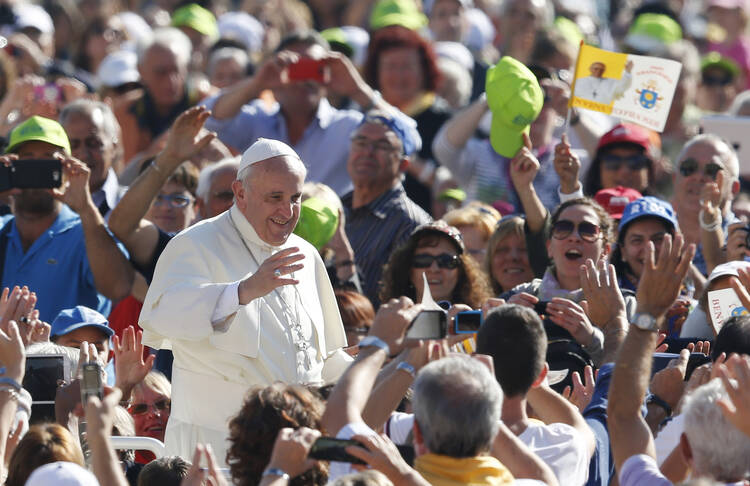From the moment he took the right name (I could not resist, dear Jesuits!), we knew something was different and even good. But little could we have imagined! Maybe we did have to go to “the ends of the earth,” as he himself said, to find such an extraordinary and compelling man as Jorge Bergoglio. One popular TV host even said, “He is threatening my time slot!”
There are so many things I would like to say, but let me limit my remarks to one dimension of the pope’s interview. Apart from the accolades he is receiving from the world press for his warmth, courage and attitude of servanthood, Pope Francis has become for many of us a living example of the very healthy fruits of the “discernment of spirits” that Paul speaks of (1 Corinthians 12:10) and the Society of Jesus has so skillfully unpackaged for the church universal.
The result is a subtlety that we have not come to expect from hierarchy, an intelligence that is non-dualistic and contemplative, an amazing courage that could only be sustained by very real prayer and a compassion that has become a challenge and inspiration to all of us. Pope Francis is not dismissing the old, but like all true prophets he is revealing what the Big Tradition was really saying all along. Looking at much of our Catholic past, I can only think of Jesus’ words to the people of Jerusalem: “How often I have longed to gather the children together as a hen gathers her chicks under her wings, but you would have none of it” (Matthew 23:38). Now we cannot get enough of it! We have a pope who gathers instead of scatters (Luke 11:23).
As a teacher of contemplative prayer and the contemplative mind, I have come to believe that the Western Church has put far too much effort and fight into metaphysics (“What certainly is”) and not nearly enough energy into practical epistemology (“How do you know what you think you know about what certainly is?”). This has made most of us victims of our own temperament, prejudices, culture and prior agendas, while presuming we are speaking for the truly catholic. I have always felt that Roman and catholic were a bit of an oxymoron. Far too often it has been our small mind’s understanding and very recent traditions that have had to pass for “what eternally is.” Ironically, it is Pope Francis’s ability to critique his own mind (“discernment”) that enables him to trust his own experience, while also balancing it with Scripture and Tradition. This is the big pay off that we Catholicshave not granted to most Christians, and that has allowed us to use Scripture and Tradition in such a wooden and mechanical way.
Today’s Gospel cautions us in this very regard: “Be careful how you listen” (Luke 8:18), Jesus says as he describes the different kinds of soil that receive the word of God (developmental theorists should love Jesus). Pope Francis is emerging as a giant corrective to so much of our small seeing and listening by telling us that the first Christian hearing aid and lens through which we receive the moment must always be nothing less than the ears and eyes of love. It is almost too simple, and yet as we have all learned, it is the hard work of a whole Christian lifetime. Pope Francis appears to be the work of art that emerges after a whole Christian lifetime. The world loves to look at it.
In case you think these thoughts are without due reference, or merely my ideas, let me quote from his now-famous interview. You will see for yourself and from the man himself. This, I believe, is the Great Tradition of our saints, mystics and prophets, now spoken by a pope:
Yes, in this quest to seek and find God in all things there is still an area of uncertainty. There must be. If a person says that he met God with total certainty and is not touched by a margin of uncertainty, then this is not good. For me, this is an important key. If one has the answers to all the questions—that is the proof that God is not with him. It means that he is a false prophet using religion for himself. The great leaders of the people of God, like Moses, have always left room for doubt. You must leave room for the Lord, not for our certainties; we must be humble. Uncertainty is in every true discernment that is open to finding confirmation in spiritual consolation.
The risk in seeking and finding God in all things, then, is the willingness to explain too much, to say with human certainty and arrogance: “God is here.” We will find only a god that fits our measure. The correct attitude is that of St. Augustine: seek God to find him, and find God to keep searching for God forever.








